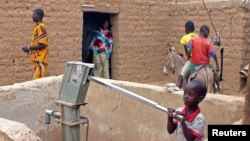Violence against aid groups and general insecurity have plunged the Timbuktu region in northern Mali into a hunger crisis, with tens of thousands of children at increasing risk of dying from malnutrition, according to the United Nations.
About one in six people in the region are suffering from acute malnutrition, the U.N. Office for the Coordination of Humanitarian Affairs [UNOCHA] said.
This includes more than 50,000 children under the age of five who, because they are malnourished, are up to nine times more likely to die, the U.N. agency said.
Aid agencies repeatedly have warned that the worsening security situation in the north "... has aggravated the vulnerability of individuals and communities," said UNOCHA public information officer Anouk Desgroseilliers.
Conflict in Mali erupted in 2012, when a loose coalition of separatist rebels and al-Qaida-linked militants swept across the north of the country before a French-led military intervention in 2013 drove them from the main towns they had been occupying.
Armed groups drove the Malian army out of many posts in the north last year, and they are now fighting each other for control of land, which has uprooted tens of thousands of people and hindered relief efforts, aid agencies say.
Humanitarian access was restricted on nine occasions in August and September this year, mainly because of violence against aid workers, UNOCHA said. The number of incidents recorded so far this year is three times higher than in 2014.
This instability has hampered the delivery of food aid and prevented health facilities from running at full capacity, so that only 13 of the 30 health districts in the Timbuktu region can help those suffering from malnutrition, UNOCHA said.
The crisis has been worsened by a bad farming season in north Mali, which led to a significant loss of cattle and a fall in milk output, the U.N. World Food Program [WFP] said.
"Malnutrition is not caused solely by a lack of food. It is a combination of factors, including lack of access to clean water, health facilities, a well-balanced diet and nutritional education," said Sally Haydock, WFP Mali country director.
The WFP is providing food aid, giving nutritious food to children under five and nursing women, and carrying out screenings in communities to find malnourished children and women, Haydock said.
Some 3.1 million people throughout Mali face serious hunger, of whom 410,000 need urgent aid, according to UNOCHA.
Mali, the Republic of Congo, Guinea and Niger agreed last month to divert a portion of revenue from oil, gold and other resources to a plan to tackle childhood hunger.
They will pay 10 cents per barrel of oil and 60 cents for every gram of gold into a fund managed by the U.N. children's agency UNICEF to buy nutritional supplements at a reduced price.





